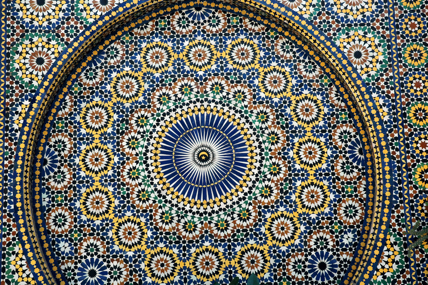“Western Muslims and the Future of Islam” throws some light on Ramadan’s idea of “Islamic socialism,” an ideology, combining religious principles with anticapitalist, anti-imperialist politics, that goes back to the time of the Russian Revolution. (Libya’s strongman, Muammar el-Qaddafi, is one who claims to rule according to these principles.) The murderous tyranny to be resisted, in Ramadan’s book, is “the northern model of development,” which means that “a billion and a half human beings live in comfort because almost four billion do not have the means to survive.” For Ramadan, global capitalism, promoted by such institutions as the International Monetary Fund and the World Bank, is the “abode of war” (alam al-harb), for “when faced with neoliberal economics, the message of Islam offers no way out but resistance.”
To be a sworn enemy of capitalism does not mean you are a communist, a fascist, a religious fundamentalist or indeed an anti-Semite, but it is something these otherwise disparate groups frequently have in common. Advocating a revolt against Western materialism on the basis of superior spiritual values is an old project, which has had many fathers but has never been particularly friendly to liberal democracy. Ramadan’s brand of Islamic socialism, promoted with such media-friendly vitality, in conferences, interviews, books, talks, sermons and lectures, has won him a variety of new friends, especially in Britain and France.
★ WaPo profiles anti-Wahhabi Saudi thinker Khaled al-Dakhil.
★ Amira Hass makes lists of the prohibitions faced by Palestinians.
★ In Britney vs. The Terrorists, Robert Reilly highlights, once again, the disaster of US public diplomacy and the decision to downgrade the serious reporting of Voice of America in favor of the MTV-style content of Radio Sawa.
★ The Forward reports on Hillary Clinton’s speech to AIPAC, in which she made attendees squirm in their seat by calling for tough engagement with Syria and Iran. But read her actual speech and you can tell she is a radical on Iran, not a moderate, and called it a threat to virtually everything in the world. She also says this:
Israel is a beacon of what’s right in a neighborhood overshadowed by the wrongs of radicalism, extremism, despotism and terrorism. We need only look to one of Israel’s greatest threats: namely, Iran. Make no mistake, Iran poses a threat not only to Israel, but to the entire Middle East and beyond, including the U.S. I don’t need to remind this group that about a month ago the Iranian government hosted a conference in Tehran whose sole purpose was to deny the Holocaust.
That’s funny. Iran is a threat because it might one day get nuclear weapons and its politicians engage in hate speech. Israel has nuclear weapons (tons), attacks and threatens countries around it all the time, and its politicians also regularly engage in hate speech.
★ The Economist on Russia’s re-emergence as a player on the regional scene. The late Yevgeni Primakov (probably among the greatest Arabist spy/diplomat of the 20th century) would be proud. And it’s a bit scary to think this is probably a positive development.
★ Eric Fair, a former US interrogator/torturer in Iraq, writes an op-ed in the WaPo about what he did.
★ A poll finds that despite government agit-prop, Arabs are not that worried about Iran:
WASHINGTON, Feb 8 (IPS) – U.S. and Israeli hopes of forging of a Sunni Arab alliance to contain Iran and its regional allies may be misplaced, at least at the popular level, according to a major survey of six Arab countries released here Thursday.
The face-to-face survey of a total of 3,850 respondents in Egypt, Jordan, Lebanon, Morocco, Saudi Arabia and the United Arab Emirates found that close to 80 percent of Arabs consider Israel and the United States the two biggest external threats to their security. Only six percent cited Iran.
★ A new blog on military issues, counter-insurgency in the Middle East and more: Abu Muqawama.
★ A report on Hizbullah’s identity crisis by Amal Saad-Ghorayeb and Marina Ottaway.
★ A rare op-ed in support of Jimmy Carter by former US Congressman Paul Findley, himself the victim of AIPAC campaigns in the 1980s.
★ May Yamani is uncharacteristically outspoken about the “moderate mainstream” monicker in a piece titled These moderates are in fact fanatics, torturers and killers.
★ Independent Jewish Voices is a new British group protesting the takeover of mainstream Jewish organizations by rabid pro-Israel right-wingers and their campaign against British Jews who are critical of Israel. This week, they took out ads in several prominent newspapers and had a series of op-eds in the Guardian. Of course Israelis are not happy about this.
★ Speaking of Jewish groups silencing Jews they don’t agree with, our friend Joel Beinin had an op-ed in the San Francisco Chronicle describing how a talk he was scheduled to give was cancelled after pressure by local California groups.
★ If you follow Fr
ench intellectual politics, last week’s endorsement of Nicolas Sarkozy by former Maoist-turned-neocon André Glucksmann has caused some reflection on the rise of French neo-conservatism, notably among prominent once-lefty Jewish intellectuals. Worth looking at, though, is how L’Arche, the main French Jewish publication, has over the years morphed into the Gallic version of Commentary.
